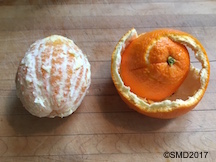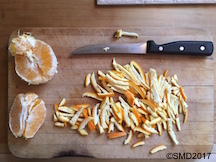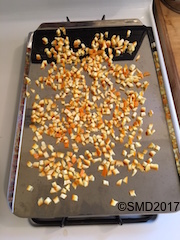Chinese New Year, Citrus Fruits, & Herbal Tea Blends
- Sheila M. Devitt
- Feb 1, 2017
- 3 min read
TIPS FOR A HEALTHY AND PROSPEROUS NEW YEAR

As an herbalist, I love growing my own herbal tea ingredients. I love wild-crafting: the art of ethically collecting herbs from abundant stands in nature. And I love salvaging herbal tea ingredients, from parts of my groceries, that might otherwise go to the compost pile.
Waste not, want not!
Orange peel fits into this last category. I buy certified organic oranges from the food co-op or farmer’s market.
When I eat the orange, I save the peel.
I cut it into narrow slices, then smaller pieces.
I spread the pieces out on a plate or cookie sheet to dry.
If you have a food dehydrator, that will work perfectly. I don’t have one, so I use the gas oven. With the oven off, the heat from the pilot light is enough to dry out the orange peel pieces.
(If your oven door doesn’t have a window, you might want a visual reminder that you have something drying in there - a note on the oven door, for example. You want to avoid turning the oven on to pre-heat, accidentally cooking your fruit peel. It will lose some of the medicinal volatile oils, and could burn.)

I usually leave the peels in overnight. If the white pith is very thick, or the climate is very humid, it may take longer. Experiment.
Once the peels are dried, I transfer them to a glass jar, and store it in the cupboard, with my other herbs and spices. I add dried orange peel to my herbal tea blends. It combines well with Nettles, Rose-hips, and Ginger for a nutritious and delicious beverage.
Citrus Peel is known as a source of Vitamin C and bioflavonoids. The essential oil has antiseptic and anti-fungal properties. In aromatherapy, citrus essential oil is known as calming and sedative, inhaled for anxiety and nervousness. (Different essential oils are distilled from the peel, the leaf, and the flower, with each plant part yielding distinct attributes.)
Orange Peel has a long history of use in Traditional Chinese Medicine. The Pin Yin name is Chen Pi, referring to Citrus aurantium, aged tangerine peel. The Navel orange common in American grocery stores is Citrus x sinensis. For my purposes, these two varieties work basically the same way.
Chen Pi is categorized with herbs that regulate Qi. It has acrid, bitter, warm and aromatic properties. It enters the Lung, Spleen and Stomach channels. It promotes the flow of Qi, and dries dampness.

Citrus peel is used in many herbal formulas, often as an assistant or servant to other primary herbs. This refers to the concept of the Four Responsible Positions of compounding formulas: King, Minister, Assistant and Servant. Citrus peel has excellent adjunctive properties. According to renowned herbalist Ron Teeguarden, “It discharges excess fire and removes obstructions, dispersing energy coagulations of the Liver, which cause a person to feel frustrated, angry, depressed, and generally unhappy.”
Citrus fruits are commonly associated with Chinese New Year. According to Therese Tse Bartholomew, writing for the Asian Art Museum of San Francisco, “Oranges are round golden fruits surrounded by emerald leaves. Their shape and color symbolize the sun and connect with the yang principle, which represents the positive element and generative force in nature. Thus oranges are considered auspicious fruits and important symbols for the New Year.”
So save your orange peels, make tea, and have a healthy & prosperous New Year!



